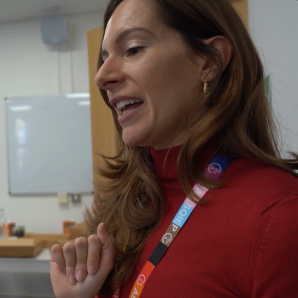We spoke to Associate Professor in Economics Education at the University of Bristol, Dr Danielle Guizzo, who is doing just that – through her research and through her teaching.
Dr Guizzo told us about the hugely significant role women economists have played in solving key national and international economic challenges through history – contributions that have often been ignored or ‘forgotten’.
She also explained how her research helps inform her teaching, enabling her to promote a more inclusive approach to economics to future generations of economists.
What are your economics research interests?
My research is on the history of economic thought – understanding how theories, how ideas, how policies have evolved over time, and how economists were involved in policy. And one of the main focuses that I have in my research is to understand women in the history of economic thought.
I had previous projects trying to understand how women economists in post-war Britain were involved in shaping the welfare state, how they were trying to solve economic issues, national accounting systems, and trying to sort out all the consequences that came up from the war.
Even though this may sound very historical, many of those techniques – the concept of what social policy means and the relationship of social policy to economics – are still applied today.
Are there particular female economists who especially interest you?
I studied Barbara Wootton. She was an economist who took the economics tripos at Cambridge. At the time she couldn't have a proper degree in economics – women could take the tripos, but they wouldn't get a higher education degree.
Barbara Wootton did work on economic methodology – on the idea of planning and of state interventions in the economy. She played a role in the post-World War II debates – capitalism versus socialism, and to what level is intervention important or not – with top economists like John Maynard Keynes and Friedrich Hayek.
But later Barbara Wootton decided to leave economics and went into sociology. So, now she’s more known in sociology and criminology than in economics.
There are others too, like Joan Robinson – she was one of the ones who should have won a Nobel prize but unfortunately didn’t. Also, Victoria Chick – working in the field of monetary economics, and Sheila Dow.
They are all women economists trying to make a difference at different periods in history – facing different challenges and barriers. I think their history and their research needs to be acknowledged. Part of what I do – in my research and also in my teaching – is to uncover the contribution of those who maybe didn’t have a voice in the past, but now it’s the time to give them a voice.
Why did you first become interested in history of economic thought?
I always had a passion for history. Before I got interested in economics, I was interested in understanding social systems and how this relates to historical processes. And economics plays an important role in that because you cannot detach what is happening in the economy with what is happening in society, what is happening in politics, and what is happening in our everyday lives.
So, I became interested in economics because I could develop my passion for history, but also do something that was more applied and very relevant to the real world.
What have been the key findings from your research to date?
One of the findings that my research offers, is that we just don't have one single correct answer.
My research is very particular because you expose the debates. So, history is not something that evolves in a very natural, steady way, but it's full of debates, it’s full of conflicts of power, it's full of interests, conflicts of interest. And this also happens in economics.
My research looks at the relationship between economic decision-making and everything else that comes with it. So, are decisions really technical or not? What are the interests involved?
In economics, we have many approaches – a menu of options to choose from. And what economists do is try to find the best approach for the particular problem that needs to be solved. But there are different ways you can interpret that, and that's why economics is not a hard science but is a social science.
So, my research tries to understand why economists have chosen option A and not option B.
What impact do you think your research has in changing people’s day-to-day lives?
Even though I do history in economics, it's very topical because my research helps to do two things:
Firstly – to rethink the relationship between the general public and economists. So, how economists make decisions, the idea of expertise, and how the public can question decisions made by economists or understand better the toolbox that we use.
Secondly – to impact upon economics education. Part of my research is to understand how students can better understand economics and how they can have a more open-minded approach – a more pluralistic, inclusive approach – to economics. I try to show students – you can do this in economics, or there is that field that you can study. Or even if you want to go into banking or finance or the more traditional areas of economics, there are elements from ethics, from power and from conflict that we can learn from history.
